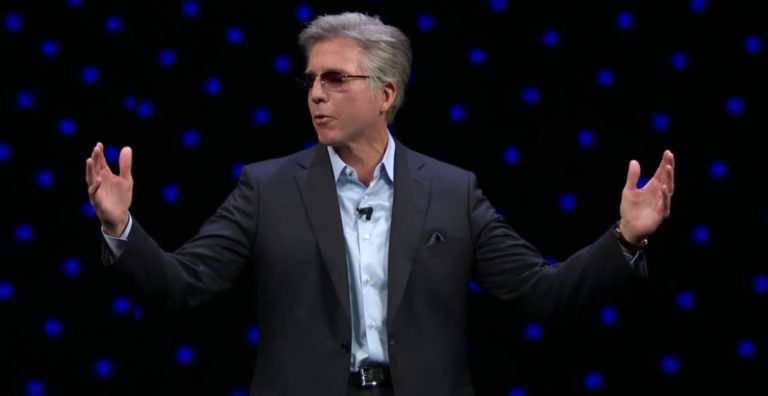 CLOUD
CLOUD
 CLOUD
CLOUD
 CLOUD
CLOUD
Fast-growing enterprise software company ServiceNow Inc. maintained its momentum as it delivered another solid earnings and revenue beat today, but unlike in previous quarters, the stock moved lower following guidance that underwhelmed investors.
The company reported third-quarter earnings before certain costs such as stock compensation of $3.72 per share, easily beating analysts’ projections of $3.45 per share. Revenue rose 22%, to $2.8 billion, above the consensus estimate of $2.75 billion. In addition, ServiceNow notched $2.715 billion in subscription revenue, up 22.5%, ahead of the analysts’ $2.66 billion target.
All told, ServiceNow delivered net income of $432 million, up from a $242 million profit one year earlier.
ServiceNow Chief Executive Bill McDermott (pictured) said the company’s ongoing momentum stems from new and existing customers doubling down on their investments in its artificial intelligence capabilities. “The mandate to put AI to work for people represents a generational technology shift,” he added.
The company is a provider of applications that help enterprises to organize and automate their information technology environments. Like many of its peers, it has been working hard to bake in various generative AI capabilities into its products, with a higher-priced tier for companies that want to access those tools.
In a conference call, McDermott said enterprises are increasingly looking for ways to make their employees more productive, and they see generative AI as one of the most promising solutions. He explained that the average worker uses 17 applications a day, which has a negative impact on productivity, but much of that work can be automated with AI.
“AI is doing the soul-crushing work so humans don’t have to,” McDermott said.
The CEO said ServiceNow’s flagship generative AI offering, Now Assist AI, has become the fastest-growing product in its history, enticing more customers to subscribe to its platform. In addition, the company is seeing a lot of interest in its new “AI agents,” which were announced in September and are designed to complete tasks on behalf of workers without supervision.
According to McDermott, some customers are already seeing good results from their experiments with ServiceNow’s agents in preview. He expects that to continue when the agents are released more broadly next month.
Rebecca Wettemann, an analyst with Valoir, told SiliconANGLE that ServiceNow’s main pitch in terms of AI is that it can help enterprises to avoid any mess. She said it can do this by leveraging its technical foundations as an information technology service management provider for critical IT processes as the control point for governing AI agents.
“ServiceNow is positioned to leverage agentic AI momentum,” Wettemann said. “It plans to release its first AI agents for customer service and ITSM in November, and although Salesforce beat it to the punch by a few weeks with its Agentforce autonomous agents, its focus on customer service workflows signals its ambitions in Salesforce’s core market.”
ServiceNow also reported remaining performance obligations of $19.5 billion at the end of the quarter, ahead of the Street’s estimate of $18.4 billion. RPO is a metric that measures the total amount of money a company expects to collect from its existing contracts with customers, including revenue that has already been invoiced but not yet earned, and future amounts for goods and services not yet delivered.
Despite the solid numbers, ServiceNow’s guidance appeared to disappoint some investors. The company is forecasting fourth-quarter subscription revenue of between $2.875 billion and $2.88 billion, which sits just above the Street’s consensus estimate of $2.855 billion.
The company also increased its full-year subscription revenue forecast to a range of $10.655 billion to $10.660 billion, up from $10.56 billion to $10.575 billion previously.
ServiceNow’s stock fell just over a percentage point in extended trading, suggesting that some investors were a tad disappointed by the guidance. Still, the stock is still up 28% in the year to date. “It looks like a case of high expectations,” analyst Anurag Rana of Bloomberg Intelligence said.
Evercore ISI analyst Kirk Materne told Bloomberg that ServiceNow’s guidance was “good, but not great,” adding that the company often tends to be somewhat conservative in its forecasts for the fourth quarter.
The company today also introduced Workflow Data Fabric, calling it a “new generation of AI‑fueled productivity for the enterprise.” It’s an enhanced integrated data layer that unifies business and technology data across the enterprise, integrating all workflows and AI agents with real‑time, secure access to data from any source.
Also today, ServiceNow announced that it’s hiring former Alphabet Inc. executive Amit Zavery, who will take on the roles of president, chief product officer and chief operating officer at the company. He replaces CJ Desai, who suddenly quit the company in July in the wake of an investigation into a complaint over the sales process for a government contract, which revealed serious policy violations.
McDermott said Zavery, who served as vice president, general manager and head of platform at Google Cloud, will primarily focus on ServiceNow’s product and engineering efforts.
Wettemann said Zavery is a key hire for ServiceNow. “His experience and expertise in packaging and pricing will be important as ServiceNow and others navigate the AI pricing challenges ahead, particularly as SaaS providers look at moving from per-seat models to more consumption and value-based models,” she said.
Support our mission to keep content open and free by engaging with theCUBE community. Join theCUBE’s Alumni Trust Network, where technology leaders connect, share intelligence and create opportunities.
Founded by tech visionaries John Furrier and Dave Vellante, SiliconANGLE Media has built a dynamic ecosystem of industry-leading digital media brands that reach 15+ million elite tech professionals. Our new proprietary theCUBE AI Video Cloud is breaking ground in audience interaction, leveraging theCUBEai.com neural network to help technology companies make data-driven decisions and stay at the forefront of industry conversations.